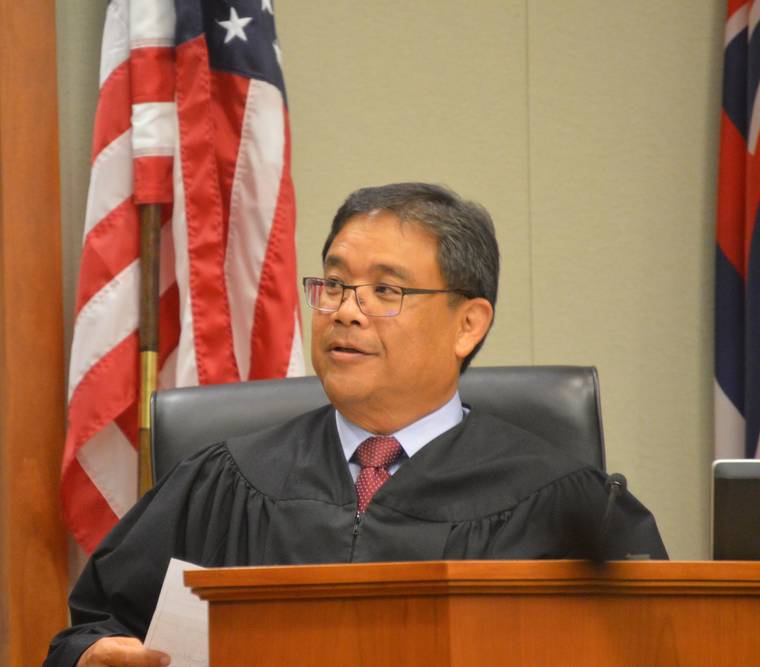An English-language learning tutor told a Hilo judge Monday she was “in shock” to discover two kindergarten boys given a “time out” by a teacher at Keonepoko Elementary School engaged in a sex act in the classroom almost eight years ago.
“I was so scared,” Linda Likiche testified during the bench trial of a civil lawsuit brought in 2016 against the state and the teacher by a mother of one of the boys.
Likiche said the alleged act occurred under the desk of one of the boys.
“When the boys noticed me, they immediately stand up,” she told Hilo Circuit Judge Henry Nakamoto.
Likiche came into the classroom to retrieve the then-5-year-old son of the mother who brought the lawsuit.
The suit seeks unspecified damages, claiming the teacher’s classroom supervision breached her duty to care for the boys and the alleged incident was preventable.
According to the lawsuit, the incident occurred Nov. 7, 2011, at the public elementary school in Pahoa.
Stephanie Albornoz, the kindergarten teacher, testified she was teaching language arts to a class of about 22 students, and the boys, both age 5 at that time, were given a time out for being disruptive in the classroom. Albornoz said the boys at first complied with the time out practice of putting their heads on their desks and remaining silent, but not for long.
According to Albornoz, the boys’ desks were out of the direct line of sight from where she was teaching the others during “carpet time,” but she was monitoring them with her peripheral vision. She said that while they resumed disruptive behavior, “I continued my lesson” to the others.
Albornoz testified the boys’ desks were close but not adjacent to each other.
“The exact location is a little bit unclear to me,” she said. Albornoz said she was unable to see the act because of the location of the boys and because books under the desk of one of the boys obstructed her view.
The mother’s attorney, Joseph Ahuna, questioned why Albornoz didn’t move the boys farther away from each other and asked if that would have been a better classroom management practice.
“No, I cannot make that assessment,” Albornoz replied.
Ahuna asked Albornoz “isn’t it true that … in plain view of you” the boys committed a sexual act?
“No,” Albornoz replied. “I did not see that.”
Deputy Attorney General William Awong asked, “If you had seen the behavior start to escalate, would you have stepped in?”
“Oh, absolutely,” Albornoz replied.
Deputy Attorney General Kathy Higham queried if it was correct that the “incident occurred in your classroom and then you find out about it only after the fact?”
“Yes, that’s correct,” Albornoz said.
“How did you feel when you were told what had happened in your classroom?”
“I was devastated.”
Albornoz admitted that on May 1, 2012, she was given a professional evaluation of “marginal” for the classroom-management checklist item “Creates and maintains a positive and safe learning environment.”
Likiche testified she didn’t tell Albornoz what she saw, opting instead to take the son of the plaintiff to his previously scheduled tutoring session and to not disrupt Albornoz or the class. She said she told another teacher, who reported the incident, as required, to administration.
Brad Asakura, an academic coach, was teacher-in-charge that day because both administrators were off-campus. He said police were notified, and he started the initial internal investigation into the incident, talking to the boys and contacting their parents or guardians by phone.
“This was an incident that I don’t think anybody could’ve predicted or prepared for,” Asakura said. “… After the initial shock … my first reaction was to try to call my administrator to let her know, apprise her of the situation.”
Asakura testified there were no criminal charges brought in the case, nor were school-level sanctions levied against either boy.
“Under this circumstance, it would be very difficult to determine … who to punish,” he said.
Ahuna called the plaintiff’s son as a witness, but the state asked Nakamoto for a bench conference. The boy didn’t testify, and the defense rested.
Alex Bivens, a clinical psychologist who identified his specialty as child sexual abuse, testified such an incident occurring in an open classroom is so “very rare and unforeseeable to the point that I would not include concerns about this in my future trainings of teachers.”
“This is the first time I’ve ever encountered sexual contact between young students in an open classroom,” Bivens told the judge. “Now, if they were at home — in a bedroom, something like that — this would be commonplace. But in an open classroom, very unusual and unforeseeable.”
Higham argued the defense “cannot prove foreseeability … neither is there any evidence that Ms. Albornoz acted with any malice or willful intent.” Higham also told the judge there was a “complete failure of the plaintiff to prove causation.”
Nakamoto granted a motion by the state to dismiss Albornoz as a defendant in the case, but denied a request to drop the case against the state. He ordered lawyers for both sides to file written closing arguments by Oct. 14 and said he’ll rule at a later date.
Email John Burnett at jburnett@hawaiitribune-herald.com.






